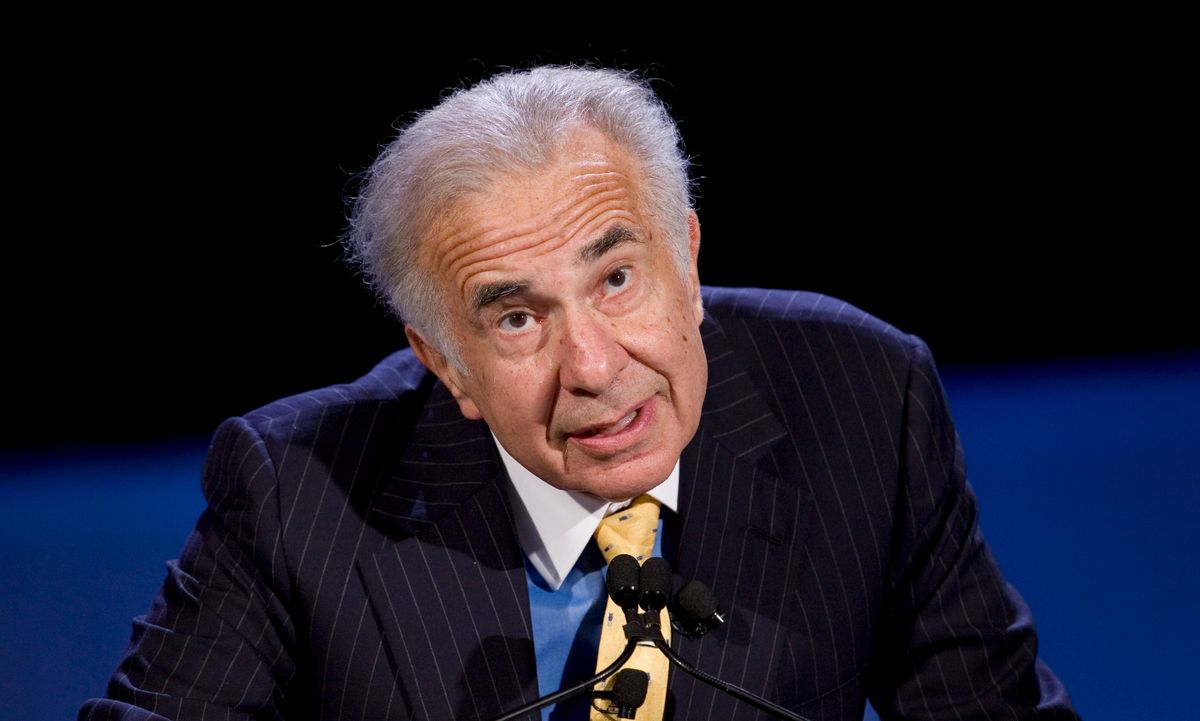President-elect Donald Trump's transition team has announced that Carl Icahn, the Wall Street tycoon responsible for destroying the airline company TWA, will play a key role advising him on regulatory reform.
"Under President Obama, America’s business owners have been crippled by over $1 trillion in new regulations and over 750 billion hours dealing with paperwork," Icahn said in a statement that the Trump transition team released on Wednesday. "It’s time to break free of excessive regulation and let our entrepreneurs do what they do best: create jobs and support communities."
Not surprisingly, the choice is being harshly criticized. Democratic National Committee spokesman Eric Walker told USA Today on Wednesday that Icahn "will also be in charge of overseeing regulatory overhauls while simultaneously controlling or owning stock in companies that could benefit from the changes he makes."
Walker later added that "the corrupt nature of this arrangement cannot be understated. Voters who wanted Trump to drain the swamp just got another face full of mud."
Trump and Icahn have known each other since the 1980s, when Trump looked up to and seemed determined to impress Icahn. He invited him to watch a New Jersey Generals football game and a boxing match between Mike Tyson and Michael Spinks, transporting Icahn the former via helicopter. Their relationship has also involved Icahn helping save Trump's Taj Mahal casino from bankruptcy in the 1990s and, much to Trump's dismay, backed a hostile takeover of Trump Entertainment Resorts as it entered bankruptcy restructuring.
"I like Donald personally, but frankly I’m a little curious about the big deal about the name," Icahn told the Wall Street Journal at the time. "If the name is so powerful, then how come they went bankrupt three times?"
Trump's response to The New York Times in 2011: "Carl is someone that, unfortunately, will always put the deal ahead of the relationships. I am a loyalist, so I don’t see friends fighting friends. But with Carl, the friendship stops where the deal begins."
By 2014, the casino group again faced bankruptcy, allowing Icahn to gain full control in February 2016. He agreed to allow the Trump name to remain on the properties, suggesting that he had both regained faith in the Trump brand and had repaired his relationship with The Donald.
"I’m not here to say Donald’s a great businessman," Icahn said in an interview with The Washington Post in April. "But I will say he’s a great consensus builder, and that’s what Congress needs at this time."
Icahn is perhaps most notorious for breaking up the airline company TWA. After taking over the company in 1985 by buying more than 20 percent of the company's stock, Icahn gradually stripped it of its assets so he could profit off of it. In 1988, he took the company private, earning $469 million while leaving the company with $540 million in debt; in 1991, he sold TWA's London routes to American Airlines for $445 million, which one former pilot described as a "killer" for the company to St. Louis Magazine in 2006; and from 1992 to 1993, TWA filed for bankruptcy so that its creditors could own 55 percent of the company, which earned Icahn $190 million.
Although Icahn resigned as chairman in 1993, Icahn insisted that he be repaid, leading to an eight-year agreement in which Icahn could buy any ticket that connected through St. Louis for 55 cents on the dollar and resell them at a discount. American Airlines estimated that the deal cost TWA another $100 million a year. Not surprisingly, when Icahn offered to buy TWA as it faced another bankruptcy, he was spurned for an offer from American Airlines.
“He put downward pressure on the amount TWA could sell tickets for because we were essentially competing with ourselves,” ex-TWA staffer John Gratz told St. Louis Magazine in 2006.
Said another former TWA pilot, "It became more and more apparent that Carl was not interested in growing the airline but in using TWA as a financial vehicle to acquire wealth for himself."



Shares